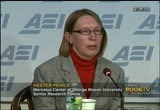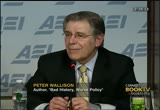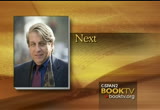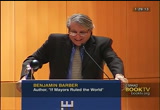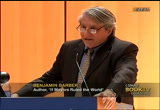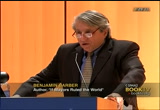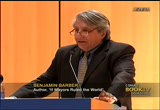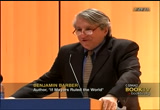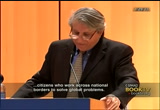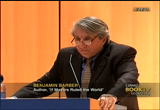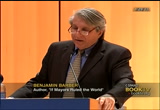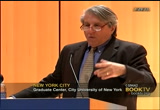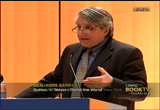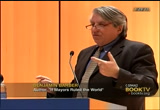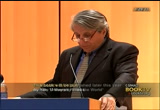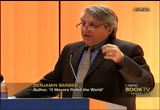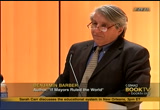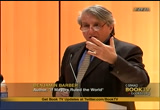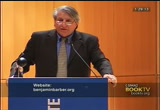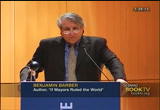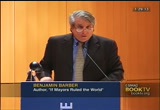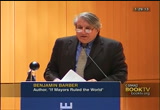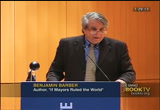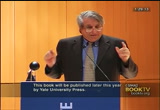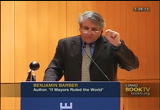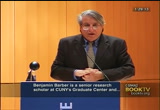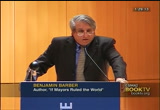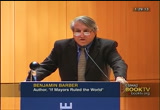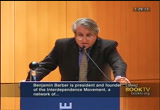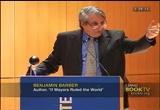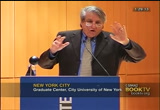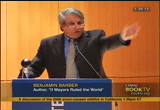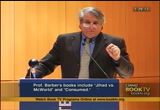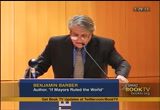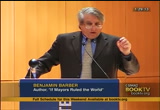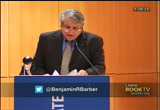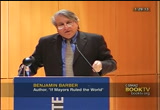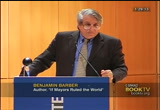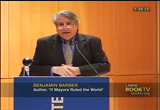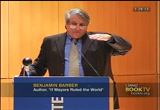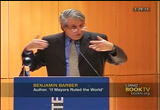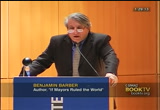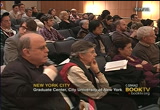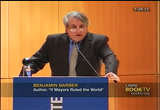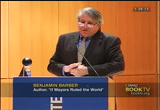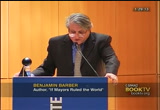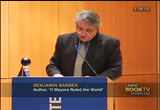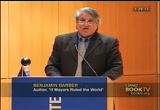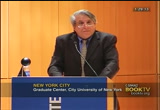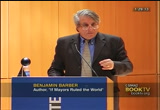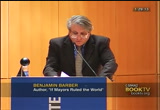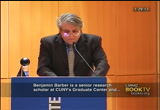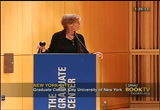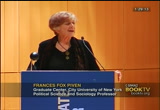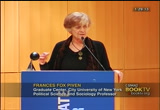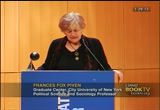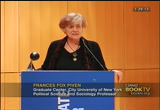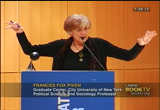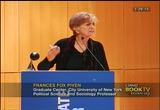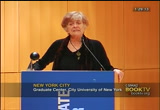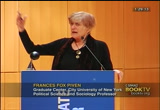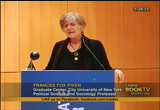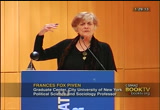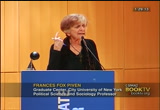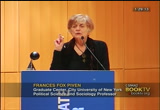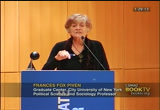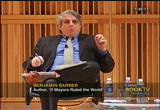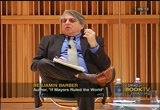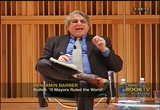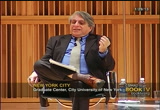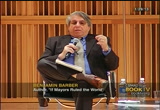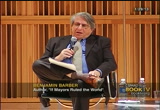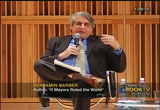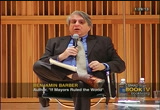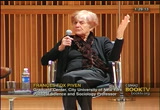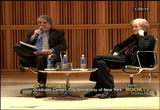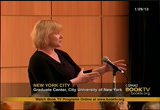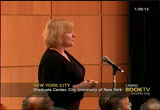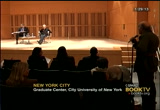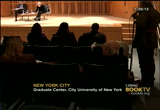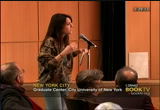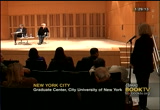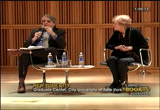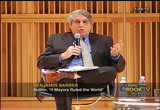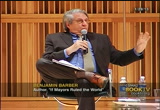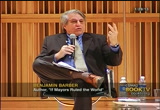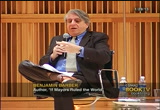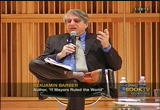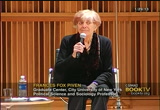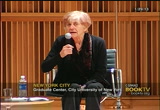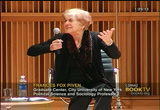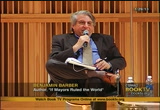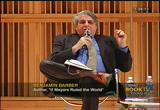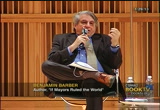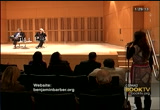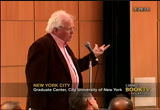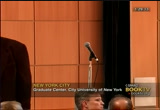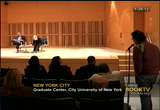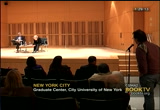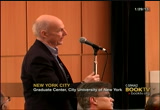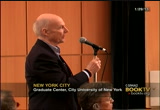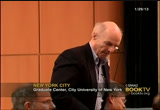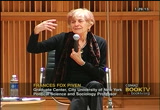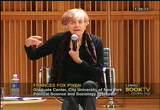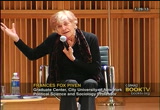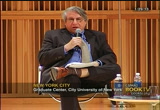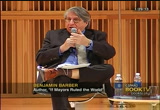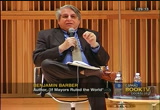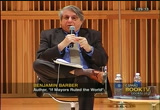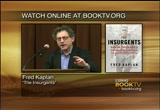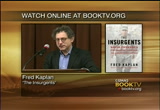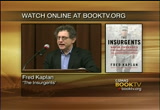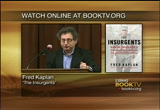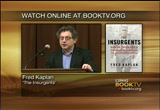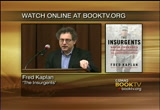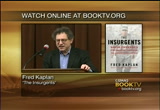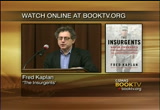tv Book TV CSPAN March 23, 2013 11:30am-1:30pm EDT
11:30 am
11:31 am
joining us at the recession, getting a book, and getting it signed. and show our appreciation for an excellent person. [applause] visit booktv.org to watch any programs you see here. type the author or the book title on the upper left-hand side. you can share anything you see on booktv.org by clicking share on the upper left side of the page and selecting format. booktv streams life online for 48 hours every weekend. book tv.org. up next, benjamin barber argues it's at the city level when things get done. in the forthcoming book, if mayors ruled the world more should be -- climate change,
11:32 am
immigration, and terrorism. this is just under two hours. [applause] thank you so much, kathy. it's a particular pressure, as you might imagine, to have the hospitality of a distinguished center at the graduate center, the center on philanthropy andsivity society, and to also have it with a friendship of a terrific scholar who has been a friend for many years. i owe kathy a special debt in her generous invitation to me to be a senior scholar at the center and bring my small organization with me. thankthank you very much, kathy. it's because of her that i am here today, and here this fall and winter and at the city university. i sworn after i left maryland,
11:33 am
having left rutgers i would not go back to the university again, but i'm very glad i broke that promise to myself and that i'm here. it's also a pleasure to be once again on the podium with francis fox piven. we met in the '70s when we were both regarded, even i was regarded as a radical scholar. some might not think it anyone. we were asked by james mcgregory to be the co-chair of the by sen bsh bicentennial -- we came up with a program that jim was alarmed by. he put in to action, i've known francis since then, and she has remained an honest and authentic voice of progressivism and radicalism in america with a deep interest in those in whom the system has shown no
11:34 am
interest, the poor and the homeless, and her work has been particularly about now how they can be helped, how they find ways to help themselves through their movement and the work they do. it's a pleasure to have her perspective this afternoon in responding to these comments. i'm very pleased with jackie davis, the chairman of the executive committee of and rachael cooper, and david bale member of the executive committee. that organization the interdependence movement which i'll talk about a little bit today is central to the thinking that lead me to the work on the cities. i hope if you're not familiar with it, you will have a look at interdependencemovement.org and gate sense of the work we're doing there. let me make some remarks about the city and suggest it changed
11:35 am
in recent years might thinking about politics in ways i hope might also change yours. and in a sense, just what i want to do this afternoon is i want to change the subject. for 400 years, roughly, when we talk politics, we talk nations. we talk sovereignty. we talk the nation state, we talk about international relations. relations among nations. we talk about the league of nations, the concert of nations. the united of nations. it has been the central preoccupation even obsession for politics for 400 years. it's been the central and pivotal and core institution of western and ultimately global licks. left side no question of the primary actor in politics for the last 400 years has been the nation state.
11:36 am
it's a special rule for the last 400 years has been as a gawrn or it and protecter of policy. it's impossible to think about social contract theory, represent institutions and think about democracy without thinking about independent nation state inside of which democracy is nestled and flour riched. we know in the 21st century democracy is in cry spins i won't -- crisis i won't waste you trying to persuade of you. i think there are few people who think differently not just here but in the western world. even in those parts of the world that are yearning for democracy and seeking it.
11:37 am
we see after libya or syria, or afghanistan or iraq or somalia, we see how difficult it is to secure democracy today in the context of the strug ming -- struggle for an independent state. in the 18th the decoration of independence spoke to the world. if you want liberty and freedom and justice you first must secure independence. that's been the mantra of democratic seeking people. the i want to discussion that the crisis of democracy today is in part because that's no longer true. that nation states can no longer vouchsafe, secured in liberty of citizens. that democracy is no longer well cared for in the nation state.
11:38 am
can no longer solve problems, protect democracy as it once did. the mantra of the nation state is independent, sovereign independence, independent jurisdiction, national borders, territory, and the frontier and the warsome states have been about frontier, borders, and brown drinks. the trouble is in the 21st century, it actually happened almost 100 years ago in world war i and world war ii, we live increasingly in a -- if you loot weapons of mass destruction every one of those threats pays
11:39 am
little heed to boundaries. every one of those threats is a cross-border challenge. every one of those threats represents a new interdependent. to take one example, al qaeda, one of the reasons al qaeda still lives despite the fact that the leadership is lick dated and drones are taking out the leaders along with a lot of other people who respect the leaders. nonetheless, the leadership is being lick with a dated. one of the reasons al qaeda survives it's what i call on the -- it belongs to no state. attacking states, laying low state governments, depleting the taliban, defeating al qaeda -- iraq. it will not stop it because terrorism, like sustainability, like markets, are interdependent
11:40 am
in their character. so what we have created in the beginning of the 21st century is a deep asymmetry between the challenges we face and the political response the political institutions we have to respond to that. every challenge is interdependent, global cross frontier, and the primary political actors that respond are bounded, frontiered, independent nation states. and in that asymmetry, you can see the dysfunction of the modern world. we watch, for example, starting four or five years in copen hagueen and going through mexico city and dubai and nations came together to renew the kyoto protocol already out of term of the date. at least to embrace that
11:41 am
antiquated document and failing to do so. and going home and saying that is because our sovereignty says china said the u.s., says now canada, even leaders on keogh know doesn't permit us to monitor, to report to international body, doesn't permit an international body to tell us what to do with the missions. sovereignty has become the on obstacle of cooperation. it has made states look more and more dysfunctional. how is that that the most powerful, well equipped military nation the world has ever seen in the united states of america can't bring a handful of terrorists to heal in benghazi or mali or afghanistan?
11:42 am
the asymmetry between a military-based on big ships, big planes, big bomb and the realty of every day gorilla who blend in out of civil began population and cross borders. it means the war machine of the greatest state there ever was was largely irrelevant to the security threats we face as we learn on 9/11 when in this city, a handful of hijackers who are living in the united states for years hijacked our planes and turned them to weapons. they didn't have to be given weapons by anyone. they seize them and use them and created devastation here. that, again, is a sign of the new asymmetry. you find it in every one of these areas from disease, the pandemic that effect us today, when i was growing up in manhattan in the 19 would say
11:43 am
don't go to new jersey, we think there's flu over there. we worried about the new jersey flu not the hong kong virus, the west nile virus our the -- or the new diseases coming out of the hot zone of africa. it comes in pandemic around the globe. no matter how good the health system, ours isn't that good, no matter how good it is, no health system is? a position to take on the global threats we face. so simple asymmetry, global world, global challenges, interdependent ens as the reality and independent nation states born two, three, four hundred years ago in a war when sovereign territory and jurisdiction could be and was the of liberty and security we need new political entity and
11:44 am
solutions to with an interdependent world. there's candidates around the traditional multicorporation which pay little attention to the nation states. unfortunately they are undemocratic. it's not the great candidate to dot work. it has the capacity to do the work. ngo, international ngo they in fact can do a fair amount but they lack power of any kind. they are unrepresentative and undemocratic. they choose their own leadership. they represent the interest of the people, they don't consult the interest of the people. the international monetary institution that came out of britain was the mostly nation state based in the nation nation and the banks that own the nation, more or less determined that policy. we are in need of new actors politically. they can act democratically, that can act across borders and
11:45 am
have an impact on the interaccident problems we face, it's there i come to the idea that there is in the oldest and original political institution possible potential for a new 21st century. interdependent end world. namely the town, the entities we first formed and every early culture where people come together around trade, creativity, around living together. neighborhoods which we gathered. the ancient which is where we started could act as an alternative actor. an alternative agent in a modern world. the great beauty, the great irony of this that is it closes a great circle.
11:46 am
western civilization, they started township, principality, trading posts, and the cities. but by the end of the ancient world of the middle ages, it was clear the cities were too small in the scale. in other words as the scale of human societies crew -- grew the township proved too small to deal with a large scale problems and so it required the inventness of the renaissance in the early modern period to create the new idea of a nation of people.
11:47 am
the nation state emerginged as a solution of the limited scale and capacity of the city to deal with the new growing problems of europe and the later of north america. and aasia. the nation state was the solution to the problem of inadequate scale on the part of the city. but now, as i just described, it's the nation state whose scale is too diminutive to deal with a global reach of the problems we face today. what i'm suggesting is that we circle back two city, not city one town, at the time but what cities can do together in networks. to work and corporate across borders to do what individual
11:48 am
southern sovereign states cannot do. the old reconstituted in a networking of polis which is a coz mop lis can become a global instrument of global cooperation. the sub tight of my book, if mayors ruled the world, why they should. that's the argument i'm trying to make now. that cities already will deeply ied. intercity associations, if you
11:49 am
look at what happening successfully in the global world have substituted themselves to solve problems and are doing so. that cities are already well on the path to soft, informal global govern mans. not an executive authority with a mandate telling people what to do through laws made, but a group of cities and mayors and counselors working together across borders voluntarily developing best practicing, exploring common urban virtue to solve problems that states have proven no longer able to take care of. i won't bore you here, it's boring important as it is. but with i can name for you inner city networks already in operation, you would be shocked
11:50 am
and suppress a long yaun, the names are boring and bureaucratic, but the reality of the institutions is extraordinary. one of the most important institutions nobody has ever heard of, for example, is the united cities and local governments uclg. 3,000 cities and local authorities that meet globally every year and the networking cities around work and environment, transportation, immigration, security, and a number of other issues. i hadn't heard of it two years ago. i doubt too many people other than that the urban specialists in the room have heard of it. but it is a living organization. most people would say i know what you mean the american conference of mayors, sister cities, maybe. but they pale in the context of
11:51 am
the actual inner city organizations literally hundreds of them. some regional, some of national, some with global scope that exist. the forty cities working on forty or fifty eight cities working on global environment doing a better job. mayors running the world. city protocol and new organization, barcelona that shares best practicing clare, the counsel of local authority, the climate alliance.
11:52 am
achievings in the nations states are lock up. unable to make any real progress. they are actually doing things important things together, and they do it because when you look at cities, the approach to govern mans, the approach to citizenship, the approach to policy problems turns out to look no different than nation states. what mayors are and do compared to presidents and prime ministers are and do is striking in the distinctions. and i'll just start with a simple fact that might startle you. there's not one mayor of any city despite the american cities who has ever become president of
11:53 am
the united states. mayors mostly don't become presidents because mayors are a different kind of politician than presidents. and part of what my book explores is what makes makers different? why don't they become president. there's some places where they do. in france they do. that's because they are chosen by the political system and not candidates. it's being part of a political career. but in most places where there they are electedded, they don't. they are different. the starting point is that mayors are among the most pragmatic problem solving politicians the world has ever seen. their job is specific, if you become, god bless the poor man, president obama, you have to achieve world trade regular lation, you have to stop the taliban, deal with chaos in libya and mali, you have to ban
11:54 am
guns or not, sealing up the borders and figuring out what do with the millions who are here without documentation. those vast, insable large scale problems lend themselves to ed yolings. big government, no government, some government. but when you're mayor, you have to plow the streets. he almost lost his job. the mayor teddy the pragmatic mayor of jerusalem in ideological times in palestinian in the '80s was known as a pragmatist and famous for having said he was in a meeting with
11:55 am
rabbis, he's arguing about access to the holy site and finally said to them, spare me your sermon and i will fix your sewer. a wonderful phrase that contrast the religious id logical wars that divide them. from the practical problems that have to be done. there's another rather unknown mayor same period. much very much like him. he almost got himself killed by insisting his job was to make it function not to engage in universal debate about the jews and the arab and the palestinians and who owned the land and who was there first. and who should do it. it is typical of mayors they focus on problem solving, if you look at what they actually say, you'll find again and again we did survey of mayors in many
11:56 am
countries and they ended up saying the same thing, our job is to get it fixed, to do things, to make things happen. we could never get away with the stuff that goes on in washington. you either fill pots or you don't. the pool is open or it isn't. someone responded to 9/11, or they didn't. when you're in the city being a socialist, being a -- conservative, those things have impact on how you view government, public-private partnership. you have to do the work of. you have a.of the united states you are a figure head if you are president of france or china
11:57 am
99.9% of the population will never do more than see your face on television. even if you are a mayor even in a big city, if you're mayor there, your neighbors know who you are. they see you in the coffee shop, the street, you can't get away much. you are a neighbor, and a politician who is your neighbor is a different breed of politician than a poll trigs who is an hon risk figure head. honor risk figure head.
11:58 am
took the oath of office in front of the neighborhood. the -- the mayors are home boys. they are from the neighborhood. they are about the neighborhood. we read about mayors like our friend in newark who run in to burning buildings and pull out people. or mayor johnson who stopped a mugging on the street of london. even if barack obama or bush wanted to, obviously the secret service would not let them get out of the limo and interfere with a mugging or run to a building. it's a different kind of job. it has a symbolic power. in the end we're not surprised when you see a mayor out at the site of an accident or pulling
11:59 am
somebody out of a burning buildings, ultimately the mayor sees himself, herself, first of all, as a neighborhood. someone who has to solve problems. this is reflected by the way in the statistics. we know that the trust in public authorities in american throughout the western world and much of the world has plummeted. congress has 12% in some poll, the presidency, not this president, the 30 and 0th. this president is considered wildly popular because he has 52% support right now. the supreme court numbers have gone down. mayors and city counsel are still in the '70s and '80s. some say it's the hallow effect. you are exempt from the general critique. neighbors retain trust in democracy that has been largely lost elsewhere, which means also our relationship to our town and
12:00 pm
city and city council is the last repository of trust and democracy in the united states western europe. the collapse of trust is a decrisis it's going fail. -- it means there is greater optimism. a lot of people like bloomberg, a lot of people don't. the thing i saw last night, somebody who doesn't like bloomberg can go up to him and scream in the ear and eventually the cops pushed him away, the guy who did it is a professional heck leer. he came to the mayor and asked questions. how come you're being protected. you have the gun guys with you. try to do that with president obama or president of china or president of frabs you can't do
12:01 pm
it. there's a different sense of our relationship to our mayors, our city councilors. citizens running for office not professional politicians who become separated by the law from those they represent. in that sense, too mayors can make a fundamental difference. also interest they have done a lot of study far more people terminate their political careers once they become mayor as mayors and anything else. if you run for the u.s. -- run for the legislature in new york state or kentucky, you probably go on to become a congressman. you a senator then
12:02 pm
governorship. it's a slippery slope upward. people fail upward as american politician, as we have seen so often. people become mayors tend end up as mayors like mayor koch. or mayor bloomberg. he'll be here in the foundation, it's unlikely that he has aspirationses. the quality takes to be mayor make it hard to actually run for national office or'd yolings and the big time rhetoric and a big voice are what really make things happen. i want to give you an example of what they have done. it's extraordinary the difference they made. i think what is the most crushing issue on the world's
12:03 pm
agenda and one no one from the china to white house and washington is paying attention to is climate change. the fact is if we don't find a way to deal with the sustainability, the sustainable environment, carbon energy, the world as we know it, weather governed by city or nation states will mostly vanish. the crisis we face in water supply in the rising oceans, in the shift of population, and immigration go drightly back to the problem of ecology. we have watched nation states sit by while all every of those tipping points whether it's two degrees in the raising of the atmosphere, whether 350 part per million of carbon in the at fear, our bypassed and go up and it's already beyond two degrees than the temperature has gone up. it's already well past 350 we are up to 420 or so and
12:04 pm
climbing. states have made an awful lot of noise and done almost nothing. but here is some interesting an optimistic facts. cities use 75 to 80 percent of the world 'carr bonn energy and are responsible for 75 to 80% of the world 'carbon emissions. they happen in city. which means even if china and canada and the u.s. and france do nothing, cities can impact carbon emissions significantly by the work they done. and indeed, that's already happening. they have already begun to do that. l.a., if i asked you where go the carbon emissions. i would say and i imagine you would say the freeway. not true.
12:05 pm
the port of los angeles is largest port in the united states, the port of los angeles was responsible for something like 42% of the carbon emission in los angeles. for a lot of smog. the diesel ships, hundreds every day come in they sit and spew diesel fumes even while tide up at the shore, delivering, 12,000 trucks a day come in and out delivering cargo and so on. old diesel engines, lots of automobile there and so on. mayor there five years ago initiated a program of reform of the port, in which he provided connections and assisted the freighters coming in and the containers coming in and hook up electrically the way yachts do in marseilles. instead of oil they were on electricity. the 1200 truck were compelled over time by private partnership
12:06 pm
and showing the trucking companies they can benefit. to upgrade the engines to hybrids. the result has been something like a 35 to 40% reduction in carbon emissions from the port, which amounts to something like 15 to 120% of the total emissions of l.a. the mayor did that. the u.s. did nothing. the u.n. did nothing. the mayor, the council and citizens of los angeles did that. and it looks very different. new york it's not the port. in new york it's also not transportation. compared to place like phoenix and san diego use car the way they do in the west. but here the bulk of carbon emissions come from buildings poorly insulated, old, darkrooms, tar room, attracting the sub. so here mayor bloomberg niche initiated a crucial round of trying to get better insulation
12:07 pm
in old buildings, better insulated new buildings more efficient air conditioning, heating with change the six from four, to two, maybe to alternative energy. paint the rooms white. again, by local municipal laws and cooperative action and private-public partnership. you can begin to actually make an sphwhaict is measurable in the course of a year. that states simply haven't and can't do. and then you find these cities coming together in the c40 in other global environmental intercity organizations exchanging best practicing and you find what new york and l.a. have done can be replicated in other places. you find something that started in the 1960 z in latin america. bike share program. and make them available to anybody is being used in 3,000
12:08 pm
metropolis around the world including new york. free bikes will be out there, get them, put them back when you're done, more and for people use bikes and you need dedicated bike lane which is they started doing. chicago is doing it. they have been doing it in latin america and rio for a long time. they are doing it now in asia. they are doing it now in africa. they're not just shifting to bikes, they are shifting to public access to bikes and public transportation systems based on bikes. or in transportation and other cities in the 1990s started brilliant idea, you can build surface sub surface lines with buses that are dedicated lanes with concrete barriers that operate like surface subways. they move quickly, they pick up people, they have express stops
12:09 pm
they get people in half the time that jobs that used to be hours away. they to it at 10% of the cost of building a subway. so dedicated, insulated bus lines that operate. it's a great idea being shared through the international organizations. and cities together are working to do it. or even in the difficult area of national security, where you think it's one area we need state doing things for us. here's a nice story from new york they tell about the post 9/11 security effort in new york. after 9/11 mayor giuliani dispatched the intelligence squad which is eight or nine detectives working on global intelligence trying to figure out what terrorist were doing. when they were going come to the u.s.? what was going to happen? he dispatched them as any smart mayor it would washington to talk with the fbi and interpoll and the cia, talk national
12:10 pm
intelligence agency and the homeland security. by the time bloomberg was mayor and ray kelly was police chief. they came back and said to ray kelly and the mayor, it's not useful. we have been for a couple of years in washington and we have learned almost nothing. a lot of bureaucracy, gossip, hard information. the agencies often don't talk to each other. they are competing with one another. washington, d.c., isn't a great place to gather intel on terrorist operations around the world. so ray kelly with bloomberg's support had an idea. why don't we redeploy the new york intel squad to global cities one by one? one to singapore, one to frankfurt, one to hong kong, one to rio, send them to the places where we are likely to get valuable information. let them coordinate and cooperate with the intel unit in
12:11 pm
other cities around the world. let do city to city security intelligence gathering. for the last seven or eighth or nine years that's what new york city has been doing. i can't say i'm not a security expert that's the reason we haven't suffered another serious attack. i'm sure that's what it has to do with it. i've heard, i've interviewed people that say new york's intelligence is among the best in the united states. i don't think it's a coincidence that intelligence comes from city to city intelligence cooperation. there's no area i can imagine where cooperation among cities directly cannot enhance the solution of problems among politicians and mayors who are compelled to solve their problems if they're going to stay in office. do you can't away with the crap that goes on in washington today. simply say we're not doing it. e with don't know which plow is
12:12 pm
the best to use with so we're not going plow the snow. we have an ed logical -- who can sharp, the blades on the plow so we're not plowing. i can't do it. fundamental difference. so what i want to suggest then is that cities, their mayors, the citizens, by the way, i said if mayors rule the world i scrolled said if -- i could have said if city management bureaucrats rule the world, probably not a great title. when i say if if mayors rule the world if the elected officials who rule the world. things could make a difference. it brings me to the proposal in which my argument issue.
12:13 pm
the proposal that in order give voice and a largeness of life and political act to what cities are already doing. what inner city organizations are doing. we need to convene something like a global assembly of city. a global parliament of payors. and in order to do that, are so you joining me, sir, or coming up to take those away? thank you. we need a global mayors pal -- parliament. not a top down executive telling cities what to do. but a representative organization that allows cities to consult, to opt in and out, and to do together what they are already doing informally. and let me just conclude by -- if you don't mind.
12:14 pm
i don't like to read. i'm going read the last few pages here of the chapter about global parliament. i want to be con skies and make clear what it's about. isn't that grandiose. isn't that kind of utopian. what i want to suggest is this when i propose a mayor's parliament, i'm not asking for a mandate for top down sovereignty by mega city. rather this is a brief sister cities -- brief cities for lend impetus to give institutional expression to emerging cooperative relationship to focus on the bottom up role cities already play in deliberating and deciding and voluntarily implementing policy
12:15 pm
and rethat meet the challenge of the 21st century. the aim is not to add the burden of a job of governing the world to the burdensome job of governing the city. it is only to understand that to govern their cities effectively they may have to play a role in governing the world in which their cities fight to survive. in govern, their city cooperatively to give the pragmatism global effect. they need not await the cooperation of the disunited nations or the state em banked dominated financial institutions or private market multinational corporation or centuries old dysfunctional nations. they can act now in ways that are symbol wick voluntary that are also practical, efficient, and potentially transformational.
12:16 pm
they can do so in ways that directly impact more than half the world's population. 52% in the world live in cities in 78% in the developed world live in cities today. but indirectly serve the entire planet. the global parliament of mayors will give them metropolis a megaphone and allow the voice to be heard. when the best practices by which cities define themselves can be shared and implemented in common, we can take inner city cooperation to the next level. what i propose then and want to propose here then is that much of the difficulty we face today lies with traditional sovereign state too large for participation. too small to address global power. i want to recommend that if we change the subject from state to
12:17 pm
cities, we can come to terms with interdependence. cities also harbor hope that incline naturally to collaboration and interagain they have always been. 90% of cities are on water. because it's about transportation. it's about concourse, it's about trade, it's about communication, it's about cultural cooperation. inner city relations -- networks cities already comprise a modest and informal but actual model of global govern since -- best practice of the city to a promissory note for the planet, it is time now for cities to start doing what nation states have consistently and recent decades been unable to do.
12:18 pm
cooperate. the city, as our future, is a demographic and democratic fact. republican vice presidential candidate, paul ryan, you might remember, a couple weeks ago suggested president obama was re-elected on the back urban voters. that's right. the city is blue. not in the narrow sen of being democratic but open, multicull cur, creative, willing to cooperate. it's a good thing. most a bad thing. it's a fact not a political'd yolings. it describes nature of the -- the globe looks ever more like the city and ever less like the rural landscape. the world we live in is multiculture, is connected interdependent. cities which make them ideal representative for today. in embracing the urban has been
12:19 pm
they is our destiny. we can begin to suspend the cynicism and pessimism about politics. we are liberated to build a -- on the approachial foundation of the ancient city. guided by the blueprint implicit in the mega size modern successors. eurozone is likely to fall apart. the cities are coming together. the united states and china may be paralyzed by the competing sovereignty and the rival abstract ed what american and chinese cities can pursue pragmatism with a support of realism. gallop ceo jim clifton indulging in a certain high person -- in
12:20 pm
fact in a fiscal and jurisdictional news held by powerful nations, cities are not free to ab nor the nations i believe they exist and operate. they have to do what they do with and not against the state. they will be there. but the world imagined here -- when sovereign stub stubbornness threatens not their right to reaction but the survival of common planet. embracing the independent logic of the city brings us full circle.
12:21 pm
we can finally rediscover the polis tuck to the core of coz closet in the world of globalization, the praise for the -- place for the democratic neighborhood at large. thank you very much. [applause] [applause] francis, would you join us please? [inaudible conversations] >> i'll stand right here. [inaudible] i'm francis fox piven at the
12:22 pm
graduate center. it's my pleasure to welcome my long time friend and colleague, ben barber. this is his maiden talk at the graduate center, i think that we are really glad to have him. [applause] i think ben mentioned that we first got to know each other some four years ago when we were asked to plan a conference, the annual conference of the american political science association, which even now -- certainly then is very austere and trickish and boring event, and we try to. it up a little bit. we had a lot of good ideas. none of which i will mention until the cameras are shut off.
12:23 pm
[laughter] and i want to say, it was adjust lot of fun to work with ben. when i told them when the ideas were it, it will improve your -- [inaudible] [laughter] so ben has a point of view about how to save the world because the world is in a kind of planet, as we know it, and our country as we know it, is in big trouble. and those troubles include the ecological crisis that we hear about all the time and go about our daily life just as we did before, as if there will be a tomorrow and a tomorrow and tomorrow but there might not be. those troubles include widening spiraling inequality. they include the erosion of the
12:24 pm
infrastructure of democratic governance but the structure of living together that means the infrastructure of transportation and utilities, the networks that we depend upon as well as the governing structure we have developed over centuries to help people that are in trouble. those are being dismantled as well. we have big problems. they are not just in the united states, although in some respects they are worse in the united states, but they also exist elsewhere burglar -- particularly in the northern hemisphere. we expect them in the southern hemisphere, and ben proposes a networking of mayors as a kind of global solution. in fact, he tells us that the
12:25 pm
network -- different organizational form is already there. it's already working on those problems, it's already helping to solve those problems, even if you think they are getting worse, the mayors are holding back the floods, and he finally proses that we ease escalate the solution we enlarge the solution by creating a global parliament of mayors. i want to -- okay. we'll do that. i'm vote for it. and now i wanted to discuss with you, ben, some of the problems democratic problems that the parliament will confront. one set of problems has to do, you slide a little over this, i think. with the question of whether local government, even urban local government is in fact more democratic than national
12:26 pm
government. is it more practical but about different things? maybe local and national government concern themselves or rather the politician that preside over local and national government have different priorities because the politics of getting re-elected and staying re-elected is dpircht on the local and national level. but the kabul that's what they always. they say closer to the people is more ghik. -- democratic isn't that what richard nixon began saying all the time. it became that republican mantra and justified dismantling new deal programs and justified dismantling a lot of great society programs.
12:27 pm
so wait a minute, is local government closer to the people? i think we have very respectable tradition that argues that local 09 gar gi is only overcome during period of national convulsion. southern would be an example of that. look at the '30 ease and '60s weren't the periods of locally based convulsion that didn't have an impact on the society so much because of the impact on local government wasn't because the mayors responded to the tremendous vail of the great transportation, or the travail of the new urban my grans in the city in the 1960.
12:28 pm
it was national government that responded in a big way and national government that roded the cities to also respond. that was true both in the 1930s, and in the 1960s. so wait a minute, local government is more democratic -- who are you thinking of? some of the examples would make me feel warm and good, you know, i kind of like john lindsay in retrospect if he made some mistakes, but csh what about -- mayor bloomberg? i think that's another matter
12:29 pm
all together. i think bloomberg will is the mayor mainly for the financial sector, he's the mayor mainly for the tourists that flood to manhattan, he's the mayor who gave high-rise condo buildings, and allowed the facilitied the direction of working class neighborhoods i lived in new york all my life, i remember manhattan as a place of working class residences and little shops. but now all i see is this stuff that is going up. well, mayor bloomberg, mayor bloomberg is the amorph most affluent people in new york more than he's the mayor of the people of new york.
12:30 pm
12:31 pm
the convenings and parliament of mayors he proposes to build -- he seems to think it is more powerful. i don't know why that would be true. if it is voluntarily and consensual and has no mandate from powerful groups in society it might be easier to brush aside. the mayors and the parliament of mayors are not after all against, they are democratic, and if they are practical, if they pay attention to millions of people who lived in their cities, who live in cities not only like new york, which is a
12:32 pm
welcome place for international capital and investment but cities like detroit and kansas and benton harbor, the mayors of these cities are against very powerful antagonists who don't care about many of these cities, who don't care about the people living in those cities, who want to use the programs which once kept those people afloat as another source of profit. they are cannibals on the public sector. that is the kind of opposition that this consensual, voluntary convening of mayors is going to be against. you can be against international finance, up against the multinational corporations, against the plundering real-estate interests in the cities and the plundering interest from other cities who want to come into places like bentsen harbor and take whatever
12:33 pm
it has that is valuable and fro the people of benton harbor over shorte . i am not confident about the network, the parliament as equal to the staff of confronting the antagonists who have to be confronted for democratic solutions in the city. so finally, ben also, i want to remind you of a kind of insight we gained from watching american federalism, and insight that tells us beware of giving authority to local political actors in a global or national world so those local political
12:34 pm
authorities, the mayors, it could be, it could even be a governor, those local political authorities are so easy to whips off by investors who are free to go here or there. we have a tremendous problem in american federalism. we have had it for at least 120 years and that problem is we have a formal stretch of government which gives large responsibility to the states, that means governors and legislatures to local government, that means mayors and city council, gives larger responsibility to these sub national government units. at the same time as capital is operating on a national and international level. that means that investors can say to a mayor or a governor and they do it all the time, give me
12:35 pm
what i want or i will do invest. give me what i want and i will invest. that is not democracy. that is living under the blackmail of capitalist class that is free to exercise the threat of exit in the global lending to dependent world. thank you. [applause] >> let me just make a few quick responses. thank you for those spirited and deeply critical comments which to cut -- i don't mean to me but our system and the issue we face but while we are doing this we would like to invite you all to invite -- questions you like to ask on microphones on either side of the hall.
12:36 pm
if you would like to come down to either of the -- either of the mikes and get some other people involved in this and take the mikes and have questions too but let me ask a couple things. the biggest and central question that i don't agree with is the problem that the question i want to ask compared to what, is there a monied elite? is there an oligarchic system in the modern global capitalist world? that exercises undue and illegitimate influence on our political relations everywhere and at every level of government? yes. you would have to be -- not to see that. the question is not is it there and find ways to fight it but the problem it is a heavy burden on all governments. but it is not, i believe, a special burden on the city and my argument is in some ways they are smaller and, quote, weaker
12:37 pm
because they're more in touch with the people that are more local, they are actually nowadays in a better position than to resist. i think right now the influence of tainted corrupt money on the american system is nowhere more obvious than washington d.c. and congress in natural -- national elections in you also see it at the state level in the city level and the neighborhood level that power is there. i don't believe it is more influential landon some ways less influential and there you have to factor in not just the democratic character of local government but the issues i was talking about, the openness of creativity of the city, what cities do, what they are and how that makes them a middle less
12:38 pm
vulnerable to the oligarchic acrosses. talking about a threat to cities, it is a threat -- [inaudible] -- are cities in a better position to deal with this than others? i think they are. your examples of federalism and someone from the 1910 dirksen senate office building 0th century i agree with you. in the third -- the federal government was a friend of progressivism. i am not sure that is true today. national government is blocking -- [inaudible] -- cities giving
12:39 pm
-- [inaudible] -- go to hospitals and use emergency rooms, cities are trying to do things that nowadays national states no longer do and the same thing is very much true in other countries around the world. the book does try -- [inaudible] -- thank you. is it on? the city, i think, tries to deal with issues that once upon a time the state did and there was a time civil-rights, universal rights was the providence of federal government and local government got in the way as we all know in the 60s federal troops escorted african-americans into state and local universities in the south because mayors of places like little rock were a big part of the problem but nowadays that has changed in fundamental ways and i know longer see the central government as a friend of progress toward justice and
12:40 pm
for real opponent of big money. i see cities as better able to do that and it seems to me big money thinks big government is really the place it wants to operate. the reason big money isn't on the side of the tea party ultimately is they don't need to make big government smaller. they can buy it and own it and put it to their own uses and that is harder to do nowadays in the city's. a quick word. mayor bloomberg, a lot of mayors about whom we can argue, talked about some of the things we have problems, i had problems with bloomberg's change of the city constitution taking a third term and had problems with the weight he brought people into the school system and it represent parents and kids but we have to balance these things out. if you look at these efforts against illegal guns and
12:41 pm
international cooperation and leadership he has shown in inner-city organizations many of which he played a leading role in, he has done many important things and one thing about mayors today is because of inner-city cooperation you have to judge not just what they do in their own cities but what they do with others and leadership. we can argue about -- and he is not -- worth your time or anything and then i found out what he had done with the port in that area, he had done important things and what is interesting about mayor bloomberg and others before him, ed koch and guiliani and so on their subject to a kind of criticism and engage in a debate about the work that on the old doesn't happen nationally other than through the polarized the geological lead as we bring to
12:42 pm
bear. what did we achieve in education or environmentalism or what's not and in that sense, mayors suggests their accessibility to us but ultimately the real question is army is not in vulnerable to influence? our mayors on the side of big money or not? as compared to what? what in the world system? my view is mayors and councilors and citizens of cities are a great place to start because cds around world remain more cosmopolitan and open and tolerant and floral and more creative than the alternative entities at the state and national level. why not make a bet on them? we bet on the nation's state for 400 years and i am not sure in the 20 first century that that is paying off? lana please democratic that on the city for a while lands see
12:43 pm
what they can do? is worth making that bet. >> turn it over to the audience. listen. i said that when i had the opportunity. when it is on the ballot by a vote for the parliament of mayors. i went on to say some of the things that could not accomplish, would not accomplish, some of the terrible obstacles the parliament would confront even if it was the most democratic members, what we might also talk about is your solution is governance structured solution, let's reform the government structure and in that way incrementally at
12:44 pm
least change the power structure of the world. isn't that fare? i will go along with that and i am not going to work on it. i will work on something else. i will work on social movements, energizing protest movements that exercise real leverage, disruptive leverage against dominant institutions that have enough power, enough rent power to force real substantive changes in policy. i vote for the parliament. >> i will vote for social movements with equal fervor. it is not be there/or. we need them to work together. my wife is deeply involved in social movements. will not just work for you, she
12:45 pm
will work with you. we are looking at a mutually reinforcing strategies, social movement, a powerful way and 30 or 40 years how the obstacles are to social movement. fraces fox piven asked how social movements work in a corrupt and tainted world and acknowledge that presentable difficulties for social movements. the ways we deal with it. these are mutually reinforcing strategies and i welcome and thank you for your vote and you have mine in return and if we continue to do both things may be democracy will be a letter better off. >> my name is robin rogers and i am a professor at queens college and i when did first to say i agree with everything you said about where we are. the nation state is a relic. i think the cities are the center of what is happening. however, however, i disagree
12:46 pm
entirely with the idea that the wealthy are not viewing politics as a place to put their money. they are not putting it into the nation state because they are not stupid either but they're putting it into philanthropy and public/private partnerships many of which are run with the mayors and public moneys to create programs to help education, prison reform. we are seeing development of the network system with people like bloomberg, gates. and 73 in billionaires. and clinton is not a millionaire. smart money going into the land for peace, not influencing policymakers. and the city you are proposing
12:47 pm
may not be democratic but focusing on philanthropic efforts to change policies in ways that if you prefer is located. >> thank you. we will take a couple questions to take a picture. are you all waiting too was the back across. >> select four add another time. >> i am a journalist. i am attracted to the idea of cities trading information to see great ideas like transportation coming out of places like brazil. is the question about a whack of ideas, that we don't know what to do or going back to fraces fox piven's question behind her comments, the question of the
12:48 pm
power to get it done versus the power of those who profit from things not getting done. i would like to ask as a practical matter, you said the big issue was global warming. i would say the big issue is probably unique quality and the power, the world is brought to whitneits knees by banks run wi. how would you take on and correct the disaster of the excessive power of multinational banks or when we get to the issue of global warming for example, what would your mayors do about whether it is the xl pipeline for chevron's operations in ecuador, and chevron for your information is not a philanthropic organization. >> thank you.
12:49 pm
>> i am a recent graduate of international relations now applying to graduate programs for urban policy management so clearly my thoughts are in line with your as being down to the urban and regional level. so my question is about what responsibilty or obligations if any towards the smaller cities that may fall within the orbit of their regional funds. obviously cities can gain a lot from each other working together and environmental or security issues but so-called second-tier cities do suffer in terms of competition for business or even greater regional or national influences governmental offices. >> i come from france so i hope
12:50 pm
i can express myself properly. you mentioned rarely a mayor would be, president and we have a very strong case in mr. chirac boosted once you have governed the city like paris which is international, cosmopolitan, problems of terrorism and everything, you can easily -- to govern a country and on this second mandate he was rather passive, i would say, as a president and actually what we >> reporter: from the french population is he was a terrific mayer, a wonderful mayor and i wonder when you wrote your book whether you had the chance to talk with him and if your book would come out in french because it would be very interesting for
12:51 pm
us as well. just a little side argument. we now have a very left oriented government and he has done a lot on his personal belief for people like -- don't know if you have heard of it but great success, and the left bank which just walking so in order to make paris a beautiful forests city but also something of pride for the french people. >> let's take those briefly and press a few remarks about them and have some more. a lot of the questions circle back to the central issue of power and economic power and financial power and power of monopoly and global capitalism in the world and one can only
12:52 pm
say anyone who thinks about power in the modern world and particularly about democratic power at any level in any institution weathered a civil society and philanthropy or local government, state government or national government or global government has to think about this parallel system, this parallel structure of money, power and fiscal power that is they're in big corporations and big banks. that is a fundamental problem. my own view is we have two choices. we can choose a kind of cynicism and say it is over, democracy is gone, basically hypocrisy is democracy, a way of pretending we still exercise some popular power when the reality is a few unique oligarchies and banking and oil and the carbon industry and agriculture and so on actually run the world and that is just the way it is and people like fraces fox piven and i talking about social movement for cities or people who argue
12:53 pm
for a progressive democratic party or progressive socialist party are just kidding themselves. that is a choice we all make. i made the choice long time ago to believe in democracy. my view was in the '60ss and to the teams century when catholics and protestants were killing each other with permission and help of king as we were able within a century or two to bring an end to religious warfare and bring something like representative social contract based nation states in to being if after the holocaust and the experiment with german fascism we were able to bring a new europe, democracy does have some capacity to impact power in the world though obviously the oligarchic power that is always there is part of the fight but if you believe in democracy as i do then the real argument and the important one is the one we are having which is and to mutually exclusive but we put more energy and effort into civil society and some people like my friend kathleen would
12:54 pm
say and she would disagree with professor rogers that philanthropy isn't just another expression of tainted money trying to use ends to influence. is partly that but it is also a consequence of people actually trying to do good deeds in a non-governmental area to make the world better place and that is whether you're a cynical or not about those things but the argument about all these power things is the question is how do we do it, can city's help? can city make a difference? can social movements that the difference? can more democratic party whether it is a republican or democratic party make a difference? can the united nations if not the general assembly, secretary-general's office make a difference? with each one of those we can say here is big money, and the rescued environment of the world in which there is no equality. you can say that or you can ask compared to what?
12:55 pm
which one makes the bigger difference? which one allows us to impact skewed power, in a legitimate power? those of the questions we need to be asking. the last questions, the smaller cities, second-tier cities, very good question. cities of 50 to 500,000 tried to deal with cities from ten million to twenty-five million, in the center of the global economy. that is not a fair competition. they troy and new york are two different questions but interestingly, middle size cities have also used creativity, innovation, their position change and detroit is beginning to look at the digital age and beginning to find that they too can get innovative companies taking over with the auto industry, midsized cities have their own attractions, many of the most attractive cities to live in, one reason cities are
12:56 pm
powerful as people love living in cities. they come to them and go to the most creative, entrepreneurial inventive people go to the most attractive cities and a lot of those cities of between five hundred thousand and 1 million and that attract very creative innovators who can solve problems so there are definitely issues between big cities and small cities that we need to deal with the also some strength. finally the french case that was mentioned over here, yes, french mayors are not elected, they are appointed as part of a political system. he was not such a successful president. and mentioned france was holland was a successful mayor for seven years. we will see if he is a successful prime minister or not. his main successes come from deploying the french army which is a good sign, but that remains to be seen. as i said, for the most part
12:57 pm
with the fringe exception some other cases, most majors don't go on to become presidents and even -- wasn't very effective. the separation between mayors and others, there are fundamental differences. and other languages i am happy to say so i hope you will look forward to having french edition and other editions of. the book looks at global cities all over the world, not just cities in the united states. >> just to correct points. the first is we should take the question compared to what seriously? and we should apply a very kind of muscular interrogation to the different strategies that we
12:58 pm
espouse. it is altogether too easy to say philanthropies sometimes does good, it helps these people, create these pretty things or whatever. so when you leave here, if you do decide to think about social movements for structural reform that will elevate mayors in the scheme of things, ask those questions vigorously and apply some sort of historical test to both of them. i don't think structural reform works with are a change in power relations. the parliament of mayors, it is not going to mean anything without an arrest, serious demand, collective power of refusal from the bottom of our office are ready and other
12:59 pm
societies. my other point and i will try to be quick about this too, is i want to scrutinize the words we use. innovation, creativity, supposed to be so innovative and creative and wonderful and cosmopolitan and all that stuff. there are things about walking down the streets of greenwich village that i used to like but i haven't liked it for a long time i have to say. i certainly don't like the fact that mayor bloomberg, i guess he agreed to this, has painted these green and blue patches on the street and put some wooden chairs on those patches and said that he made the city beautiful. that is all for the forest, not new yorkers.
1:00 pm
auld this innovation and creativity and cosmopolitanism and so forth has to be subject to democratic scrutiny. doesn't just have to do with both, it also has to do with taste. i don't want a city that caters to the taste of the upper class and the case of the tourist for the tourist business. be careful about that innovation. he is not going to let me get away with that. >> i was born in lenox hospital and grew up in new york. we are both old-time new yorkers. i don't like a mollified times square that looks like the suburbs in some ways but on the other hand every time i went to a 40 second street cinema having three older men trying to pick me up and have sex with me when i was 10 or 11 years old. you can choose the way you do it.
1:01 pm
i am not a tourist and are like times square and herald square where cars don't run through and we sit down and have lunch and a lot of people who work in the buildings around them, we have lunch every day in those places. rather swarms of tourists? there are and for the new york economy there are in those places but those spaces also have to do with ecology, sustainability, livability of cities and in europe they have had for zones, car free areas and neighborhoods for a long time. those are flanked by the same micmac world stores we have better mollifying them and i don't like when i go to indiana, half of most wars i see are the same global marketing concerns use each year, but as compared to what? i want to agree completely with fraces fox piven when she says we can't just a little cliches, we have to interrogate those terms but i want to say in
1:02 pm
defense of philanthropies that i have written critically about the big monopolistic philanthropy that do away with small-scale philanthropy that allow competition and different approaches but on the hole if you look at george soros or bill gates and want to say in terms of the world or malaria or small children living longer and women getting on i would rather have a world of philanthropy than without although i could design a philanthropic world that maybe didn't have bill gates or george soros in it that was ideal but in terms of the real world of philanthropy i am glad to have those philanthropies and the other thing to be careful of is having too that bill gates and george soros, they're so monopolistic and tied to big money, the fact is a lot of lives have been saved around the world in the developing world because of the work that those philanthropies have done despite
1:03 pm
the connections with tainted money and their monopolistic operations that make it harder to have choices. let's have another round here. would you start? >> i am in prof. rodgers's class and my question is more with regard to the city's ability to just and deal with issues of ideology. use the very highly of its ability in pragmatic areas. and the relationship between iran and israel much resembles the relationship between coveys and tehran. there are strong relations within certain cities, other cities have not crossed those boundaries. >> my name is tom murphy.
1:04 pm
the phrase you trust cities, they were and burdened with the sovereignty. i will not address myself to jerusalem. stay with new york. i was reading this morning the biographies of all the freshmen legislators. what were the previous employment and more of them were political consultants and big honchos in albany. and assemblyman moving up the ladder. less of them were mayors, counties, supervisors, school board members, i don't know who will tell you what to do but they will tell new-york city which is older than the state
1:05 pm
immature city, mature economy and a creature of the state, can't even set speed limits down here. most cities are not mature, they are not mature but overwhelmed, i was reading about car raucous? cannot go to bed at night without hearing the gun fire. and the city has forgotten the city mayors, netter tell you they're making up as they go along. >> my name is barnaby spring and i'm an employee of the new york city police department, licensed
1:06 pm
teacher and licensed principal. i support principles in schools that are overwhelmed and other situations. recent one being figuring out the budget. and budget cuts that coming, a workable plan and teacher evaluations. and dancing with dynamite, history of social movements, and what happens to social movements when they get taste of power the dance that goes on between social movement? and empowered and the other guy i am reading, edgar more and talks about complexity. and in south bronx they come to school living in conditions and
1:07 pm
poverty and incredible pain. and see it decreasing. as i look at both of you up there the real question i have when thinking the about interdependency and collaboration and danger of words for is what is the structure that might exist between social movements and the parliament of mayors? how might a parliament of mayors if they had to adhere to a certain criteria or critical attributes of membership you don't just get to be a member of this parliament because you are mayor of the big city and demonstrate some sense of balance between the multi corporations and people who are dying in your city because of deals you are making with corporations and what kind of structure could a social movement give to make sure these mayors on this parliament are hearing the voices of these
1:08 pm
people? in other words rather than voting for the parliament and doing my own thing, how do we vote for the parliament together, let go of one of the concept is of howard is going to manifest and let go of results and see what happens if we truly collaborate and try to find a balance between the voices of the oppressed and the voices of field presser woppressor who ar horrific situation. >> professor mcclintock, go ahead. >> i would like to ask a question about the historical precedent. he said the nation state is a 400 year enterprise to get to its current condition of perhaps
1:09 pm
the kline. i am taken by t . i am taken by thedecline . i am taken by the. i am taken by the idea that in interactive network autonomous cities and better adapted to solving fundamental problems facing people over a longer term future. but i think that the point about the power of various parties to the life of this city have great ability to impede that process. if we look at the history of the nation states over a 400 years, it was a monarchist cantor prize of existing to facilitate the
1:10 pm
interest of a very small class. i am wondering either in the parliament of mayors or as a prelude to arriving at a parliament of mayors, what the real sources of countervailing power might be in a large historical development that would enable a more democratic or civic republican or common space vision of the city to actually come in to dominance against the privatizing forces within it? >> this is our last round. i would like to talk to you longer, but let me very quickly
1:11 pm
make a couple comments in response to the most recent round of questions and comments. first, i want to speak on the question of this three speakers ago, speakers ago the question of movement and power over time or in other words most of you would be familiar with this kind of issue, don't movements arise in a historical experience only to precipitate a responses which results in the integration of some leaders from the movement, may be some softening of the grievances, the rank-and-file and the movement disintegrates, disappears, evaporates into the general population and impetus
1:12 pm
for reform disappears. and in the shape of the confessions that were made and sirius. what can i say about that. i just made the case for the questioner that that is the way it has been. you have to have another movement. movements are not rationed, movements can emerge all the time and was jefferson who broke the idea in american history of a continuous turmoil challenge, popular challenge, popular unrest, popular refusal. the movement is over time going to fizzle. its leaders will show up as bureaucrats, but that is where we have to organize a new
1:13 pm
movement and also maybe i am not responding to the points -- the difficult question to call a parliamentary left or parliamentary dissidents relates to dissidents in the movement, the dissidents on the street. this is a big question or sudden question and comes up in real life all the time and the question that the greens have disappointed us in germany and conservative parliamentary bloc but historical parties and the impetus, the energy of the movement, a gay-rights to the party. and having said that, indicated
1:14 pm
too much faith in the parliamentary bloc that is associated with the movement. it is parliamentary bloc or parliamentary success of the movement -- movements have fashioned solution on this side of the air and fashioned solution out of the crisis they created in the system of government and in our society, the legislature or the parliament -- >> thank you again for your vital contribution to this ongoing, of the pleasures of being at the university is knowing it will continue -- really time to answer appropriately to what was asked and the important question about
1:15 pm
iran, and tel aviv, and the implicit point was just the way money colonize democracy at the federal level and local level, ideology could also colonize democracy and the point was tel aviv and tehran are not instill to it -- isolated from the ideological questions that put iran and israel at odds with one another. that is true but compared to what? if i am asked who is more likely to come to terms, tel aviv and pteron or the government of israel or the government of iran i will put my money on the two cities first. i would rather they have and go on that than what is part of the general argument. u.s. and china or los angeles and shanghai, turns out the mayor of los angeles reached out to shanghai to solve transportation problems in a way the u.s. and china, that is the answer to that. barnaby spring asks an important
1:16 pm
question. chapter 11, chapter 12 is global parliament. chapter 11 is civil society and social movement. going into that an important chapter about role of social movements that are in that chapter along with other discussions including occupy wall street and other more recent movements that have had an impact. those are part of the synergy. i thought you wouldn't let me but you found by was doing it would taint your reputation. i want to add one thing. barnaby didn't say, barnaby was an actor and artist who became a teacher and educational innovator because he believed he got the answer, education can make a difference, it can be part of how we confront the deterioration of democracy and we haven't talked about it today but with social movement and social society and change in
1:17 pm
government structure, education remains an absolute the central issue painted as it is by money and ideology as well and barnaby is trying to show in that area even in the bureaucracy like the new york school system you can make a difference and he has. last point to my friend robbie mcclintock about the history of this countervailing power. i want to say ultimately the only countervailing way to deal with ideology, to deal with tainted money, inequality and global power systems that are legitimate is democracy itself. jefferson said a long time ago that the remedy for the abuses and ills of democracy is more democracy and the question for us is what does that mean in the modern world? what does it mean to have more democracy and philanthropy, more democracy in school, more
1:18 pm
democracy in social movements, more democracy in government structures that that is the faith of the democrats, when democracy is in trouble we need not less democracy or alternative democracy but more democracy. and to interrogate as francis tells us what fat actually means in each of these important domains. thank you, fraces fox piven, thank you all for being here. good night. [applause] >> booktv is on facebook. like us to interact with booktv guests and viewers. watch videos and get up-to-date information on events. facebook.com/booktv. >> here are the latest headlines surrounding the publishing industry this past week. publisher henry holt and company announced former secretary of state condoleezza rice is writing a new book on democracy.
1:19 pm
a news release from the publisher said she will recount, quote, stories from her career and personal life to shed light on the essential questions of contemporary democracy. the book is set to publish in late 2015 the senator elizabeth warren announced this week she is writing her tenth book, titled rig, about the freshman senator's experience following the american financial crisis and her fight for the middle-class. senator warren said she anticipates it will be published next year. the supreme court decided in a 6-3 warning that buyers of copyrighted material such as books and movies and resold those, and copyright holders, the major copyright decision stems from a case brought by publisher john wiley and sons who are former university of southern california student buying cheaper text books from his home country of thailand and selling them for profit in the united states. the supreme court decided that
1:20 pm
copyright holders rights terminate when their materials are resold in another country. stay up-to-date on breaking news about authors, books and publishing by liking to us on facebook-facebook.com/booktv or follow us on twitter at booktv. you can also visit booktv.org and click on news about books. >> you are watching booktv, 48 hours of nonfiction authors and books. every weekend on c-span to. here are programs the lookout for. and 1:30 p.m. john mccain looks at the s carranza fire followed by stephen hess at 3:30 of the atomic careers of washington reporters he talked to in the 1970s and tonight at 8:00 eastern booktv is live from the 2013 virginia festival of books, discussion between representative john lewis and john carlos. at 10:30, john locke presents his book at the brink:will obama
1:21 pm
push us over the edge? later at 5:00 eastern we bring you a selection of programs honoring the tenth anniversary of the start of the iraq war. watch these programs and more on booktv. for a complete schedule go to booktv.org. >> here is where the story starts to get interesting. i am condensing a lot of things but giving you the basics. general david petraeus is sent to fort leavenworth. a lot of people in the army didn't really like general david petraeus. they don't like officers who are too bookish or stood out too much and general david petraeus was guilty on both accounts so he is sent to fort leavenworth, kan.. a lot of people were thinking that is great. the fare haired boy, sending him to pasture, literally. he goes to fort leavenworth and realizes something, he realizes
1:22 pm
this is actually the intellectual center of the army. they form the curriculum of the general staff college and organize the national training centers and through a loop through these together, the lessons from one affects the lessons of the other which affects the patterns of the next and he says to himself, what kind of powers he potentially has. he says holy cow, jeepers, super, he says holy cow, they put an insurgent in charge of the engine of change. he views himself as an insurgent. meanwhile, meanwhile, there are a lot of meanwhiles, meanwhile there is a professor at the school of advanced international studies in washington d.c. named elliott cohen, imminent military historian, also a leading neo conservative. one of the people signing
1:23 pm
petitions that react to invade iraq and invade saddam hussein by force. he is a member of the defense policy advisory board. he goes over to iraq to look at what is going on. the only member of the board did go there. this insurgency mounting and nobody knows what to do about it. he comes back feeling upset because feeling pangs of guilt because he was advising this administration. he advocated for this war. his son who like him had graduated from harvard had recently joined the army and was going to be sent to iraq, sent into this mess that he sort of helped create so he thinks he has to do something about this so he sets up a seminar in vermont and goes through his military journal and invite everybody can find who has
1:24 pm
written anything remotely interesting about the subject of counter insurgency warfare and comes up with 30 people. they all assemble for five days to discuss these things. the pivotal thing about this meeting is not so much what they discussed as that they met. most of these people didn't know each other before. they didn't know of one another's existence. they thought they were out on a limb, on a daring when writing stuff nobody was going to read, knowing what was going on in the mainstream army. a lot of people were junior officers. some were mid-level officials for think-tank types and they realize they formed a community and might be able to do something if they worked together so they come away with a great sense of mission. meanwhile general david petraeus sitting in leavenworth knows a lot of these people at this conference. some were his students, people
1:25 pm
who had been under his command and he decides one thing he is going to do is write a new counterinsurgency field manual for the army and he draws on this group to be his inner circle, to be is aids, people who helped him write this conference, outside the usual channels within the army. four things happen at the end of 2006. one, there is a midterm elections, democrats win, george bush fires donald rumsfeld and hires robert gates. 2, it is announced general david petraeus will be going back to iraq as the top commanders. number 3, george bush announces that he is ordering a surge of troops in iraq, sending another 20,000 troops.
1:26 pm
number 4, that he is changing strategy to essentially a counterinsurgency strategy. he calls it clear, cold and build which is an old phrase being that you clear an area of insurgents. they are not capable of holding it. and help the government provide basic service and build trust in the community and build a security structure. these four things did not happen by coincidence. it was all part of this plot. when i use the word plot i am generally not a conspiracy guy but these people refer to themselves as a plot. they call themselves the cobol or the west point mafia because a lot of them came out of the social science department at west point which had a tradition of forming networks among their own graduates. this was very conscious.
1:27 pm
for example, all of this happened not by clinton's. general david petraeus when he was in leavenworth he was not just sitting in leavenworth. he had a vast network of old colleagues in the pentagon bureaucracy. he deliberately forms a back channel. he cultivates this woman in the white house who is president bush's chief adviser on iraq in the national security council. she is wavering from the existing policy, they're talking on the phone every day. picture this. really kind of outrageous. here is general david petraeus, a three star general in fort leavenworth, she is talking on the phone every day with the senior adviser to the president of the united states. she will be asking him general kc, a four star general actually commanding troops in iraq,
1:28 pm
general kc says we only need one more brigade. what do you think? general david petraeus would mustard these arguments that she could funnel to her seniors on why this isn't really enough. when he comes to washington, they meet in out of the way restaurant. this is not a paula broad well situation. this is strictly professional. can you imagine? essentials subverting the chain of command to get his own views across. he has always kind of been off the reservation guy just as emotional he had gone his own way in doing what was necessary, here in leavenworth he does what needs to be done but at the same time there is a civilian analysts to use to teach history at west point named fred cate and who has done a study advocating a surge at the american enterprise institute. general david petraeus and his contact use their connections to get the study into the white
1:29 pm
house, directly to president bush, into the pentagon to the new secretary of defense to some of the support and that in iraq who are chafing at the restrictions so that basically by the time general david petraeus become the top commander everything is lined up. it is all lined up so that he can go in and impose their strategy that he wants to impose with the full cooperation of the united states government. this is not a coincidence. has all been very explicitly coordinated. >> you can watch this and other programs online at booktv.org. >> are you interested in being a part of booktv's online book club? each month we discuss a different book and author. this month we will discuss michele alexander's the new jim crow:mass incarceration in the age of colorblind this. post your thoughts about the book on twitter with the hash
107 Views
IN COLLECTIONS
CSPAN2 Television Archive
Television Archive  Television Archive News Search Service
Television Archive News Search Service 
Uploaded by TV Archive on

 Live Music Archive
Live Music Archive Librivox Free Audio
Librivox Free Audio Metropolitan Museum
Metropolitan Museum Cleveland Museum of Art
Cleveland Museum of Art Internet Arcade
Internet Arcade Console Living Room
Console Living Room Books to Borrow
Books to Borrow Open Library
Open Library TV News
TV News Understanding 9/11
Understanding 9/11